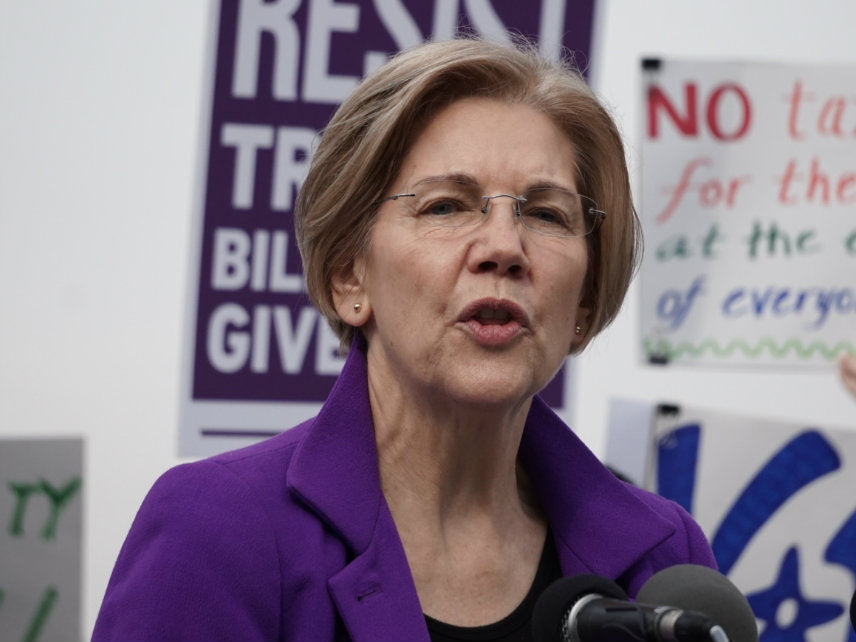Consumer Financial Protection Bureau
Fight Over CFPB Director Shows—Again!—How Powerful Government Entities Backfire on Their Creators
Liberals and progressives might soon find themselves agreeing with libertarian critiques of the CFPB's unaccountable structure and powerful director.
Today the architect of the Consumer Financial Protection Bureau, Sen. Elizabeth Warren (D-Mass.), attended a rally to protest President Donald Trump's appointment of Mick Mulvaney to be acting director of the powerful regulatory agency.
Appointing Mulvaney, Warren warned in a series of tweets on Saturday, will "destroy the agency" and "turn the CFPB into a disaster."
The only thing that will turn the @CFPB into a disaster is for @realDonaldTrump to ignore Dodd-Frank & name an acting director determined to destroy the agency.
— Elizabeth Warren (@SenWarren) November 25, 2017
There is both a legal and a political side to the controversy that erupted this week when both Mulvaney and former CFPB deputy director Leandra English claimed they were the rightful heads of the agency. Unusually and importantly, the bureau is run by a single person instead of a multi-person panel. Former CFPB director Richard Cordray appointed English as the agency's deputy director before resigning last week, but federal law gives the president the power to appoint agency heads when vacancies occur. Both Mulvaney and English have reasonable claims based on different federal statutes, but Mulvaney's claim is probably a little stronger, for reasons Peter Suderman detailed yesterday.
Federal courts will settle the legal question (UPDATE: On Tuesday evening, a federal judge refused to block Mulvaney's appointment). As a matter of politics, though, the progressives who championed the creation of the CFPB find themselves in a difficult spot here. They can oppose Mulvaney's appointment to run the agency on the grounds that he will use the CFPB's powers to radically alter the relationship between financial institutions and consumers, or they can oppose libertarian critiques of the unaccountable power vested in the singular position of the agency's director.

They can't have it both ways. To support the CFPB as an entity that should not be subject to significant oversight from either Congress or the White House means that the director gets to do pretty much whatever he or she wants.
Congress built the CFPB to be isolated from oversight. Its budget comes directly from the Federal Reserve, removing Congress' ability even to control the purse strings. That means Democrats won't be able to steer a Trump-appointed director at the CFPB even if they take back control of the legislative branch after the midterms. This has been one of the chief critiques of the bureau ever since the CFPB was created. Indeed, it was the subject of a federal lawsuit that led a three-judge panel to rule the agency's structure unconstitutional. The ruling was appealed and re-heard by the full court in June.
"The Director enjoys significantly more unilateral power than any single member of any other independent agency," wrote Judge Brett Kavanaugh in the unanimous opinion. "Indeed, other than the President, the Director of the CFPB is the single most powerful official in the entire United States Government, at least when measured in terms of unilateral power."
This has been a point of contention since the inception of the CFPB. Ordinarily, independent agencies authorized by Congress—like the Securities and Exchange Commission and the Federal Communications Commission—must have a multi-member commission at the helm. The CFPB was created by Congress but a political compromise during negotiations over Dodd-Frank left the bureau with a single executive.
That's a compromise that CFPB supporters might now wish hadn't been made, because the unchecked power of the CFPB's director may soon reside in the hands of someone who, in Warren's mind at least, wants to tear down the agency she worked to create.
For what it's worth, Mulvaney told reporters yesterday that "rumors that I'm going to set the place on fire or blow it up or lock the doors are completely false." Still, he added, "anybody who thinks that the Trump administration CFPB will be the same as an Obama administration CFPB is simply being naïve."
The shortsidedness is stunning. As long as the right people are running agencies like the CFPB, Warren seems to be saying, then the unaccountable nature of the bureau is just fine. The problem is that no one will always agree with the people who run government agencies, and the only solution to that problem is to stop handing over so much power to unelected—and in the case of the CFPB, unaccounable—executive branch officials.
